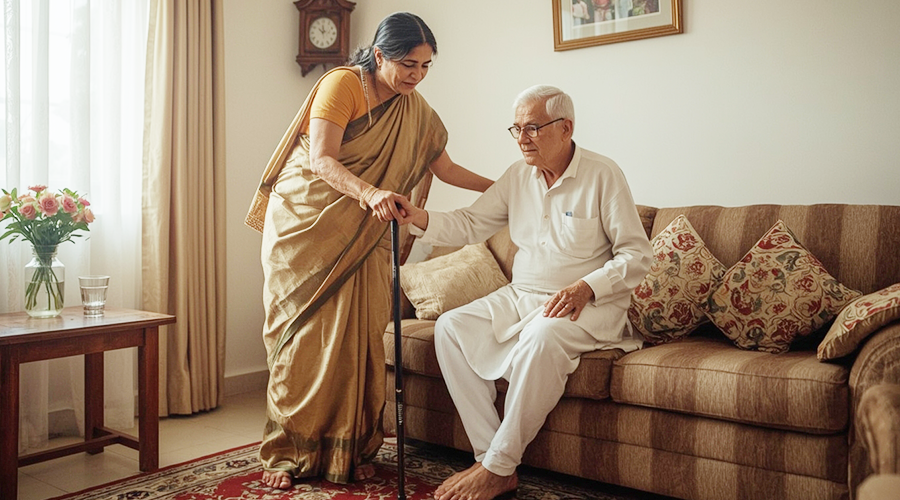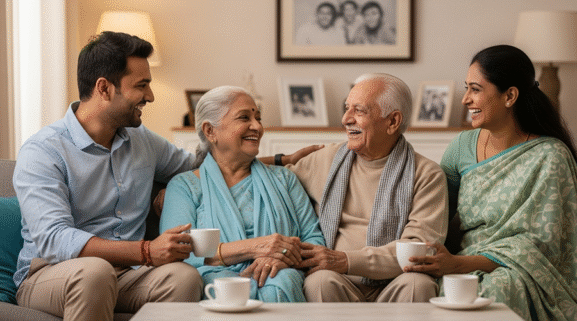When One Becomes the Caregiver: Supporting the Stronger Partner in Senior Couples
In many senior couples, one partner often becomes the default caregiver when the other’s health declines. While this caregiving role is born out of love, it brings its own burdens—loneliness, fatigue, emotional stress, and sometimes declining health of the caregiver themselves. This blog explores the emotional challenges, the meaningful purpose, and practical ways to support spousal caregivers, ensuring that their efforts are recognized and sustained.
Why Do Spouses Often Become the Caregivers?
In older age, especially after 70 or 80, health rarely declines equally for both partners. It’s common for:
- One spouse to remain relatively mobile while the other struggles with chronic conditions.
- Couples to prefer “managing at home” rather than seeking external help.
- Cultural values—especially in India and Asia—to place responsibility of care within the family.
Studies show that globally, over 70% of elder caregiving is provided by spouses or adult children [WHO, 2021]. Spousal caregivers are particularly vulnerable because they are often the same age and may face their own health limitations.
The Hidden Struggles of Spousal Caregivers
While caregiving is an act of devotion, it comes with challenges that are often unspoken:
- Physical strain: Lifting, assisting, and daily chores can be exhausting for seniors themselves.
- Emotional fatigue: Constant vigilance, worry, and lack of personal time can weigh heavily.
- Loneliness: Caregivers often feel invisible, as attention is focused on the ill partner.
- Declining health: Caregivers may ignore their own check-ups, medications, or rest.
- Loss of identity: Their role shifts from partner to “nurse,” changing the dynamics of marriage.
A review in Ageing & Society found that spousal caregivers often report lower life satisfaction and higher stress, yet simultaneously express a strong sense of duty and meaning in caregiving [Cambridge University Press, 2021].
Why Acknowledgment Matters So Deeply
For spousal caregivers, recognition of their role can be more valuable than material help. Hearing words like “You are doing so much, and it matters” validates their effort and prevents feelings of invisibility.
Senior Care Joy Insight: Simple gestures of acknowledgment—phone calls from children, appreciation from relatives, or even small notes of thanks—uplift caregivers and remind them they are not alone.
Finding Meaning in Caregiving
Despite the struggles, many spousal caregivers find purpose in their role:
- Love expressed through action: Caregiving becomes a way of honoring decades of partnership.
- Maintaining dignity: Helping their spouse feel comfortable at home preserves dignity.
- Spiritual or cultural meaning: In many traditions, caring for a spouse is seen as a sacred duty.
- Modeling values for children: Adult children often learn empathy and resilience by watching caregiving in action.
Research suggests that caregivers who reframe their role as purposeful and meaningful show lower rates of burnout [NHS, 2022].
Practical Ways to Support Spousal Caregivers
While acknowledgment is vital, families and communities can also offer tangible support:
1. Share the Load
- Adult children can take turns with medication management, appointments, or even meal preparation.
- Neighbors or relatives can step in occasionally, giving the caregiver a short break.
2. Encourage Self-Care
- Gentle exercise, meditation, or even a 15-minute daily walk can refresh energy.
- Scheduling their own medical check-ups must not be neglected.
3. Micro-Moments of Joy
- Listening to favorite music together.
- Watching old films as a couple.
- Simple activities (gardening, prayer, puzzles) that bring shared smiles.
4. Respite and Support Groups
- In many cities, NGOs and senior care organizations provide respite services—short-term caregiving help at home.
- Online or local support groups allow caregivers to share stories, reducing isolation.
5. Create a Backup Plan
- Families should proactively discuss contingency plans if the caregiver’s health declines.
- This eases anxiety and ensures continuity of care.
Checklist: What Spousal Caregivers Need Most
- Acknowledgment and appreciation
- Occasional breaks (respite care, family help)
- Attention to their own health
- Small moments of shared joy with their partner
- Community or family support networks
Case Example
Imagine a couple in their late 70s. The husband is recovering from a heart condition, while the wife, still mobile, takes on most caregiving responsibilities. She manages his medicines, meals, and even emotional comfort.
From the outside, she looks “strong,” but inside she battles fatigue and loneliness. What helps her most is when her children call daily, acknowledge her effort, and occasionally send help for chores. The recognition doesn’t erase the struggle—but it makes her feel seen, valued, and less alone.
Closing Summary
Spousal caregiving is one of the most profound expressions of love in later life. Yet, behind the devotion lies exhaustion, loneliness, and physical strain. Recognizing and supporting caregivers is not just about easing their burden—it’s about honoring their role and ensuring their well-being too.
When families and communities validate, support, and share in the caregiving journey, they not only strengthen the caregiver but also bring dignity and comfort to the spouse being cared for.
Key Takeaways
- Spousal caregivers often face hidden struggles—physical, emotional, and social.
- Acknowledgment and appreciation are as vital as practical help.
- Families can support caregivers by sharing responsibilities, encouraging self-care, and providing moments of joy.
- Caregiving, when reframed as meaningful, can bring purpose and strengthen bonds in later life.
Question for Readers: Have you seen a spouse take on the caregiver role in your family? What small gestures made the biggest difference in supporting them? Share your thoughts—we’d love to hear.


